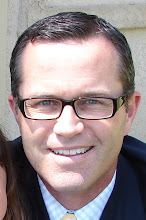"When you ask people...what it is like being part of a great team, what is most striking is the meaningfulness of the experience. People talk about being part of something larger than themselves, of being connected, of being generative. It becomes quite clear that, for many, their experiences as part of truly great teams stand out as singular periods of life lived to the fullest. Some spend the rest of their lives looking for ways to recapture that spirit."
Peter Senge, The Fifth Discipline, as featured in Prisoners of Our Thoughts by Alex Pattakos.
When I was in college I had the single greatest team experience of my life. I was a member of the men's chorus at Loyola Marymount University under the inspiring, demanding and deeply meaningful direction of Paul Salumunovich, truly a master of choral conducting. Coming out of high school I was the embodiment of the "big fish" who had been swimming around in the small pond of choral music and theater. Sure, I had some musical ability but I wasn't much of a "technical" musician and my audition to join the choral program at LMU was an abrupt and unsettling reality check about just how big the ocean was in which I would now be swimming. I recall Mr. Salumunovich (years later I endeavored to call him "Paul") at one point saying to me: "you do know it's important to actually do the exercises I am asking you to do, right?" Pretty humbling stuff.
Once I got my sea legs I knew I had become a part of something truly special. Rehearsals were intense and fun, the music was challenging and gorgeous and the camaraderie was the best type of "male bonding." We were silly and juvenile until the downbeat came and then it was the best of musical professionalism and integrity. The most memorable part was how I learned to be a part of a group within a group and to own the results of my work, both good and bad. As you likely know, a choral group is typically made up of at least four sections. Each section is responsible for learning its part AND integrating that part into the whole. This demands study and practice and then a ton of listening to truly get it right. Done well, and all four of those parts (sometimes six and even eight) sound like they are coming from one voice. When that is achieved it can be a moving experience for the listener. I know it's a transcendent experience for the singers. And, we got there many, many times in the three years I was privileged to be a part of it.
In the years following college, because my choral music experience - my membership on this incredible team, had been so singular, so special, it was years before I even considered joining another group. When I did I was mostly dissatisfied with the experience because it just never measured up. This was troubling for me because of how much I love to sing. My standards and expectations had gotten so high that nothing could meet them and I frequently felt like I was settling for something "second best."
Was it worth it? Absolutely. My collegiate choral experience truly does stand out as a singular period in my life that was "lived to the fullest." It opened up to me the possibility of that kind of experience and for that I am deeply thankful. I hope to find it again in choral music as I have in other parts of my life and yet I know I may be looking for "ways to recapture that spirit" for a very long time.
Friday, October 30, 2009
Thursday, October 29, 2009
Sunday, October 18, 2009
Contact Hitter
I've been thinking a lot about baseball recently. More accurately, I've noticed myself using a lot of baseball metaphors. I think it started a few weeks back when I took a swing for the fences and ended up hitting a run-like-hell-and-barely-beat-the-throw-to-second double. Since then I've been working out some ideas on impact, progress and change. My conclusion is that real change only happens one single (one bunt?) at a time.
When it comes to lasting change - in an individual or in an organization - there is no such thing as a home run. One swing can certainly determine the final outcome of a ballgame but it's all the pitches, catches, strikeouts, walks, steals, tags, slides, rundowns, pop-flys, groundouts, hits and errors taken together that make it a complete game. You don't get the chance to end it unless you've gone through everything that must come before. And, sometimes, just when you think it's about to end it just keeps on going (witness Yankees v. Angels in Game 2) and you need to find yet another way to bring it to a close.
Unlike a ballgame, however, for each of us and for any organization that is "built to last" there is no final out. Our ballgame is about sustainable results over time. Trying to accomplish that with one big swing is just poor strategy, a recipe for short term growth and long term decline.
My new mantra is to "hit for contact." To develop as I hope to and to influence change in my company, I am focused on each distinct opportunity, each conversation and interaction. How can I advance this runner? Wha's the best way to get on base in this situation? How can I just put the bat on the ball in this moment?
Post script: baseball actually is the best example...just think of what's become of Bonds, McGwire and Canseco.
Subscribe to:
Comments (Atom)
